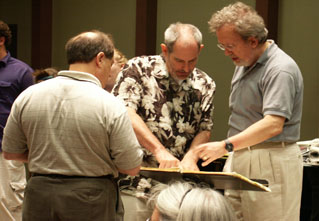Last time, we talked about the types of auditions, based upon whether or not the winners were going to get paid to be a part of the group if they were accepted.
This time, I’d like to focus on the audition qualifications for members of amateur groups, and we’ll talk about what both leaders are looking for first.
Pre-Qualifications
Whether the group is small or large, good or bad, young or old, they are a reflection of their director. A group with an incompetent director is almost always bad, and vice versa.
As a prospective member of the group, take a close look at it, and do some internal measuring of your “fit”: Are the group members all 20 years older or younger than you? Do they all dance, and you have two left feet? Do they specialize in a style of music that you like? If you feel that the group might be a good match, ask to observe a rehearsal. In a typical situation, it shouldn’t take more than 30 minutes to discover whether or not you feel comfortable with what is going on: the group dynamics, the leader’s interaction with the members, the pace, and the intensity of the rehearsal.
If you still want to join the group, speak to a member of the group, or the director, individually, and ask what the audition process is like. You may find that the process is as simple as “show up to the next rehearsal, and we’ll get you some music.” If not, listen carefully to what the audition might be like, including the things that are not said. Then prepare to the best of your ability to show the leader that you will be a “good fit” for the group.
As a director, you will want to know, at the very least, some basic general information in any audition process. That information will include some or all of the following:
- name
- contact information
- general musical background and/or training, or lack thereof
- the musical section of the ensemble the auditionee thinks is the best fit
- why the auditionee wants to join and/or what they believe they will contribute to the group
- any special skills or intangible that the auditionee thinks might be valuable to the group
General Audition Criteria
As the director of the group, you will want to establish the applicant’s ability to contribute to the ensemble in three areas:
Musical
At the most basic level the question is what is the person’s skill level? Can they play or sing a scale? Can the play or sing that scale in tune? What kind of tone do they naturally produce? Big? Small? Pretty? Boisterous? Can they change their tone when asked? How well do they read music? Can they handle passagework? What is their rhythmic acuity? How are their listening skills? If they are a singer, can they match pitches? Can they reproduce a series of pitches played for them? What is their range? Are they currently, or have they ever studied privately? Participated in ensembles before? Where? When? Under what director? Do they have what it takes to be a soloist?
Social
Every group has a social persona. Will this person fit in? Can they pull their weight? Are they a potential prima donna? If they need to spend some time as “last chair” in the section will that be a problem? Will they naturally be a recruiter for the group?
Intangibles
Is there some sort of spark to this person? Do they bring fund-raising, or ticket-selling, or graphic design, or organizational skills to the table? Do they have leadership potential? Do they know the arts editor of the local newspaper? Can they design and run a website? Can they be an accompanist in a pinch? Take some time to have a conversation with the applicant to see if there is something special there that might not otherwise be apparent.
We’ll talk more about what to expect in an audition in Part Three. In the meantime, please leave a comment below.












You must log in to post a comment.